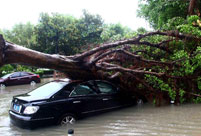WASHINGTON, Oct. 10 -- NASA administrator Charles Bolden said Thursday that he had directed the space agency to reconsider applications of Chinese researchers who were banned from attending an upcoming planetary conference.
Bolden was responding to a letter he received early this week from Frank Wolf, chairman of the House Appropriations subcommittee that funds NASA, who crafted a law in 2011 that prohibits government funds from being used to host Chinese nationals at NASA facilities.
In the letter, Wolf claimed that the law "primarily restricts bilateral, not multilateral, meetings and activities" with the Chinese government or Chinese-owned companies. He also said it " places no restrictions on activities involving individual Chinese nationals unless those nationals are acting as official representatives of the Chinese government."
In his response, Bolden said it's "unfortunate" that six Chinese participants were refused attendance at the Kepler conference, scheduled to take place at NASA's Ames Research Center in California next month.
Bold pledged to review the applications once the U.S. government reopens.
"Any of them applying and meeting the clearance requirements in place for foreign citizens will be accepted for participation in the Conference," he added.
Organizers of the meeting, the Scientific Organizing Committee of the Second Kepler Science Conference, said they learned about the law in late September while drafting the final agenda, and then they denied the registration of six Chinese researchers for the meeting.
"We find the consequences of this law deplorable and strongly object to banning our Chinese colleagues, or colleagues from any nation," the organizers said. "The policies that led to this exclusion have had a negative impact on open scientific inquiry. We feel very strongly that it is wrong to exclude scientists, on the basis of nationality, from a meeting that welcomes free and open exchange of scientific ideas."
The exclusion of Chinese researchers sparked a boycott by several prominent American researchers, including Debra Fischer, who leads a research group at Yale University, and Geoff Marcy, an astronomy professor at the University of California, Berkeley, who is well-known for his pioneering work on exoplanets.
The law introduced by Wolf has drawn criticism from some U.S. analysts.
"I believe the current U.S. prohibitions on cooperation with China in the area of human spaceflight are counterproductive," said Gregory Kulacki, a senior analyst with the U.S.-based Union of Concerned Scientists' Global Security Program. "They serve no beneficial political, economic or strategic purpose and may, in fact, harm the strategic interests of the United States," he told Xinhua earlier this year.
Kulacki said he was hopeful that with the passage of time, the U.S. Congress "will adopt a more constructive set of policies that encourages greater contact and cooperation between space professional in China and the United States."
 2013 Colour Me Rad 5K run held in Canada
2013 Colour Me Rad 5K run held in Canada China's destroyer Qingdao sails out of Sydney Harbor
China's destroyer Qingdao sails out of Sydney Harbor Chinese tycoon aims to restore London's Crystal Palace
Chinese tycoon aims to restore London's Crystal Palace Typhoon Fitow affects 4.56 million people in east China
Typhoon Fitow affects 4.56 million people in east China Game for the brave: 'Spiders' in Yandang Mountains
Game for the brave: 'Spiders' in Yandang Mountains Travel peak witnessed on last day of National Day holiday
Travel peak witnessed on last day of National Day holiday  New couples take wedding photos during holiday
New couples take wedding photos during holiday Serena Williams stumbles through to quarterfinals
Serena Williams stumbles through to quarterfinals Thailand Mobile Expo 2013 kicks off
Thailand Mobile Expo 2013 kicks off Photo collection of Chinese Navy
Photo collection of Chinese Navy Dense haze envelops N China
Dense haze envelops N China Twins Culture Festival kicks off in Beijing
Twins Culture Festival kicks off in Beijing UNESCO world heritage site: Montale Tower
UNESCO world heritage site: Montale Tower Israeli drone crashes into Mediterranean, fragments recovered
Israeli drone crashes into Mediterranean, fragments recovered Serena Williams wins second China Open title
Serena Williams wins second China Open titleDay|Week|Month